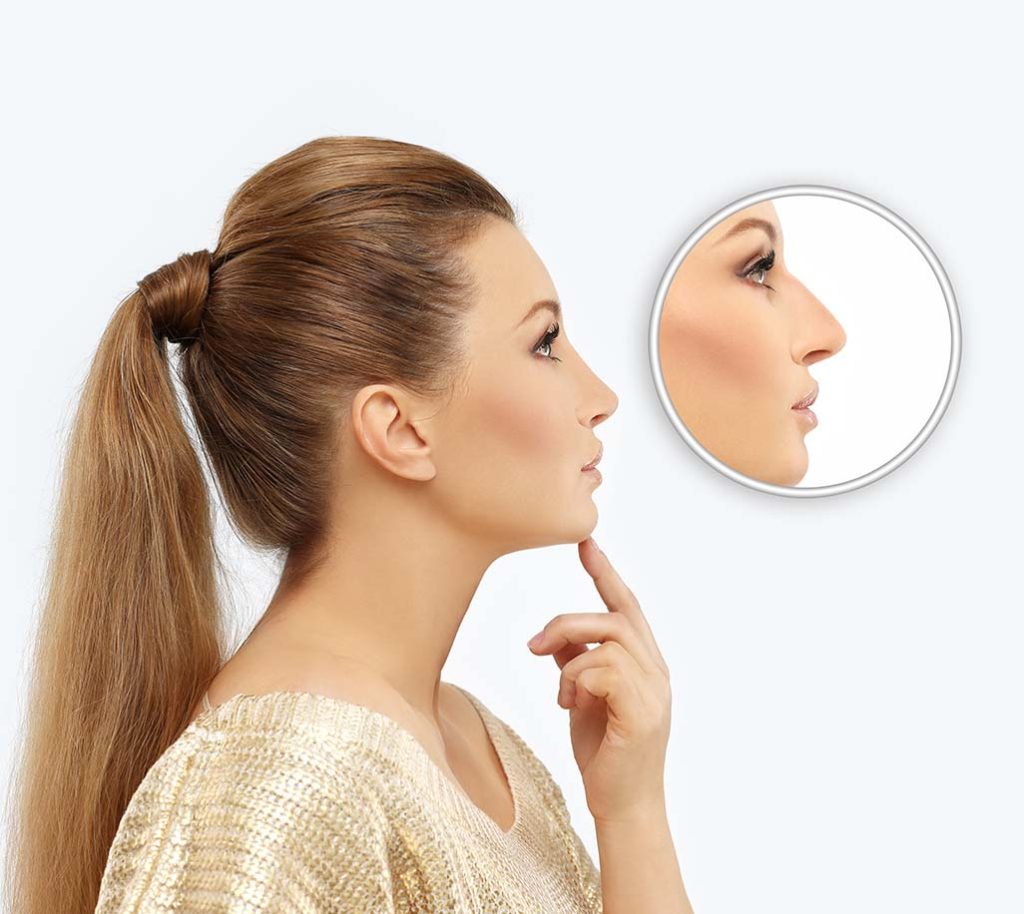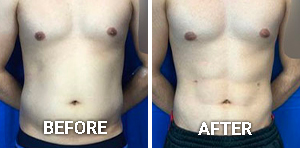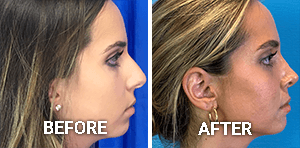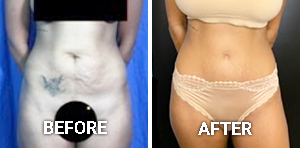What is Rhinoplasty Recovery Like?
Conveniently located to serve the areas of Beverly Hills and Greater Los Angeles

If you’re considering a nose job (rhinoplasty surgery), it’s important to know what to expect during recovery. Of course, no recovery period looks the same as another, but this blog post will give you an idea of what happens in the days and weeks after your surgery. By knowing what to expect, you’ll be better prepared for the challenges ahead and can manage your expectations accordingly. Rhinoplasty recovery generally falls into two parts: the first few days after surgery and the long-term recovery process that continues for several months. Let’s take a look at what you can expect during each phase. Are you ready for rhinoplasty? In 2020, over 350,000 men and women were! [1]
One of the surgeons offering rhinoplasty surgery is Dr. Michael Omidi, M.D., F.A.C.S., a double-board certified plastic surgeon with a reputation in Beverly Hills and Los Angeles for excellence in rhinoplasty surgery. Schedule a consultation to find out more by calling (310) 281-0155 or filling out this form.
Are you enjoying our blog? Check back often for more informative articles like this, or contact us to suggest a topic about which you’d like us to write.
Contents
Immediately After Surgery
Your surgery is complete, and your new nose looks… bandaged. Dr. Omidi will fit you with a protective splint that covers your nose during the first part of the healing process. But you will most likely be too groggy to care. Feeling out of it is expected; that’s what anesthesia does.
Your next stop is a recovery room where our incredible nurses will monitor you for any complications. Once the nurses are satisfied that you are stable and Dr. Omidi signs off, we will discharge you to go home.
Remember, you’ll need someone to drive you home from the hospital as the anesthesia can make it dangerous for you to operate a vehicle. No matter how good you feel, we will not release you without a companion.
How Will I Feel The First Night After My Nose Job?
The first night is usually the hardest. You’ll be exhausted from the surgery and likely have some pain and discomfort. The best thing you can do is get some sleep. Did you know deep sleep can help you heal? That’s right, your body needs sleep to heal and repair itself, and the better quality of your rest, the sooner you will be up and about showing off your new nose. [2]
Here are some tips to increase your comfort level and get a good night’s sleep:
- Take your pain medication as your doctor prescribes to help manage the pain and discomfort so you can rest.
- Use a few pillows to prop yourself up in bed to help reduce swelling and ease some of the pain.
- Apply a cold compress to the areas around nose for 20 minutes to help reduce swelling and bruising.
- Drink plenty of fluids to help prevent dehydration and thin out your mucus, which can help reduce congestion.
The best rest comes with unplugging your devices in a cool, dark room, so do your best to prepare your recovery space before surgery. If you still need help sleeping, talk to Dr. Omidi and his helpful staff; we can offer solutions to help you get some sleep.
The First Few Days After Surgery
For the first few days after surgery, you will likely feel tired and want to continue resting as much as possible; this is normal, so give your body time to heal. Rushing your recovery can complicate things, so take it easy. Avoid any strenuous activity or exercise and protect your nose from anything that may bump it; this includes your kids and pets!
You will have a follow-up appointment with Dr. Omidi within the first few days after surgery; this is an essential appointment as Dr. Omidi will check your progress and make sure you are healing correctly. He will also remove your dressing and any packing placed during surgery.
You may have some drainage from your nose for the first few days after this appointment, which is normal. Just be sure to keep a clean towel handy to catch any drainage gently.
Your eyes may begin to look blackened, or you may have bruising around your nose and cheeks; this is also normal and will dissipate within a few days.
You May Also Experience
- Nasal congestion and difficulty breathing through your nose
- Swelling of the face
- Sore throat
- Ear pain or pressure
- Headache
- Numbness in your cheeks or upper lip
These are all typical side effects of surgery and will resolve on their own within a few days to a week. In the meantime, Dr. Omidi will provide helpful tips to manage these side effects.
How Will My Nose Look When My Splint First Comes Off?
As with many cosmetic surgeries, sometimes things look worse before they look better. For example, when Dr. Omidi removes your splint, you will see your new nose for the first time. Remember that your nose will not be fully healed at this time, so it will not yet look the way Dr. Omidi intends. Your nose will likely be swollen and bruised, and the final shape of your nose will not be visible until the swelling goes down. But once that swelling goes down, you will be blown away by your new nose!
That reminds us, it’s important not to blow your nose for at least two weeks after surgery as this can cause more swelling. When you start sneezing, open your mouth to avoid any pressure on your nose.
A Week or Two After Surgery
By now, most of the side effects from the surgery will have resolved, and you should be feeling much better. The bruising and swelling will have decreased significantly, and you will be able to breathe much better through your nose. You may still have some congestion and drainage, but this will also improve with time. You can resume most of your low-stress activities within a week after surgery.
You will have another follow-up appointment with Dr. Omidi at this time. He will assess your healing and give you the okay to resume normal activities. Just be sure to take it easy first and avoid strenuous activity or exercise for three weeks.
You may still have numbness in your cheeks and upper lip, but this will resolve within a few weeks to months. If you have any questions or concerns during your recovery, don’t hesitate to contact us. We are happy to answer any questions and help you through the process. Recovery from rhinoplasty surgery can be challenging, but by knowing what to expect, you can make it through with ease.
Emotional Recovery
People often forget the toll recovery from surgery can take on mental health. Of course, it’s normal to feel down or even depressed after surgery, but this is especially true for cosmetic surgery.
It can be hard to see yourself in the mirror when you don’t recognize the face staring back at you. You may feel like you look worse before you look better, but trust the process! It may help to keep the inspiration photo you brought into your consultation handy, so you can remember why you started this process.
It can also be hard to come to terms with the fact that you had surgery, and you may feel you have to hide it from the world. But there’s no shame in getting surgery to improve your appearance. On the contrary, you should be proud of yourself for taking this step! Some may even call this self-care; we certainly do.
If you struggle emotionally during your recovery, don’t hesitate to contact a therapist. A therapist can help you work through any feelings that surface after your surgery. Rhinoplasty is a big decision, and everyone responds to surgery differently. Even if you know logically that your nose will look incredible when it heals, it can be tough to see past the bruising and swelling in the meantime.
The Final Results
Finally, the healing process is complete, and your nose looks the way you imagined it! All that discomfort and patients pays off when you love the nose you see in the mirror. Your nose will not only look refined on the tip or bridge but magically look like the nose you were born with. That’s the beauty of rhinoplasty — it can create such a natural look that no one will even know you had surgery. And isn’t that the best result of all?
If you’re considering rhinoplasty surgery, we encourage you to contact us to schedule a consultation with Dr. Omidi. He is a board-certified plastic surgeon with years of experience performing this procedure. He will sit with you, answer all your questions, and help you decide if rhinoplasty is right for you.
Schedule a Consultation for a Nose Job in Los Angeles
As you can see, a lot goes into recovering from rhinoplasty surgery. But by being prepared and knowing what to expect, you can make the process easier for yourself. Don’t wait any longer to schedule your consultation. We’re available for patients in Beverly Hills and the Greater Los Angeles area by calling (310) 281-0155.
We look forward to hearing from you!
Resources
- PLASTIC SURGERY STATISTICS REPORT 2020.; 2020. https://www.plasticsurgery.org/documents/News/Statistics/2020/plastic-surgery-statistics-full-report-2020.pdf
- Adam K, Oswald I. Sleep helps healing. BMJ. 1984;289(6456):1400-1401. doi:10.1136/bmj.289.6456.1400





